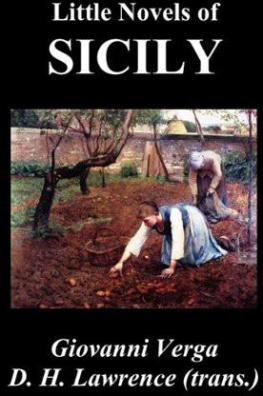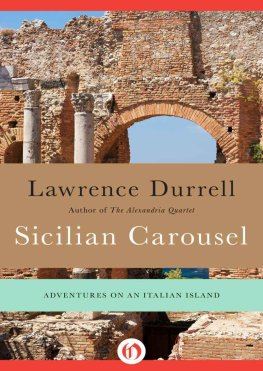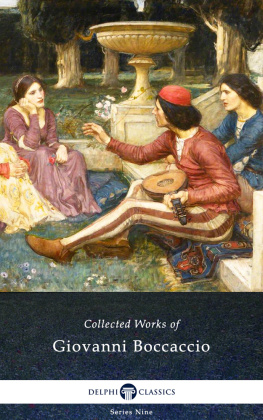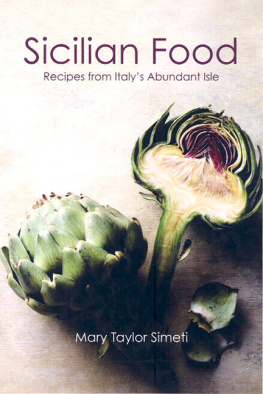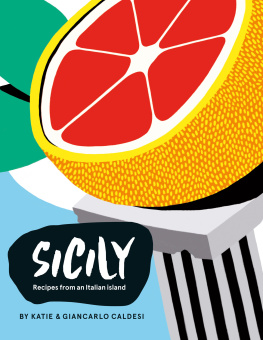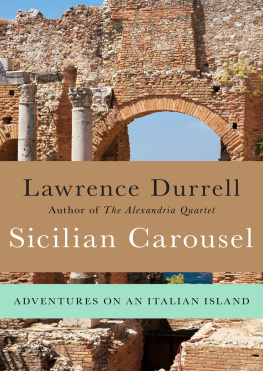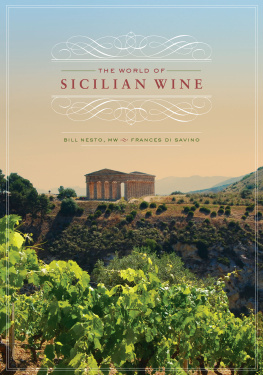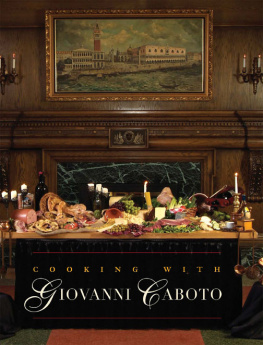LITTLE NOVELS OF SICILY is a translation of "Novelle Rusticane." There has also been published in English MASTRO-DON GESUALDO, by the same author, also translated by D. H. Lawrence.
D. H. Lawrence
NOTE ON GIOVANNI VERGA
Giovanni Verga, the Sicilian novelist and playwright, is surely the greatest writer of Italian fiction, after Manzoni.
Verga was born in Catania, Sicily, in 1840, and died in the same city, at the age of eighty-two, in January, 1922. As a young man he left Sicily to work at literature and mingle with society in Florence and Milan, and these two cities, especially the latter, claim a large share of his mature years. He came back, however, to his beloved Sicily, to Catania, the seaport under Etna, to be once more Sicilian of the Sicilians and spend his long declining years in his own place.
The first period of his literary activity was taken up with "Society" and elegant love. In this phase he wrote the novels Eros , Eva , Tigre Reale , Il Marito di Elena , real Italian novels of love, intrigue and "elegance": a little tiresome, but with their own depth. His fame, however, [Pg viii] rests on his Sicilian works, the two novels: I Malavoglia and Mastro-Don Gesualdo , and the various volumes of short sketches, Vita dei Campi ( Cavalleria Rusticana ), Novelle Rusticane , and Vagabondaggio , and then the earlier work Storia di Una Capinera , a slight volume of letters between two school-girls, somewhat sentimental and once very popular.
The libretto of Cavalleria Rusticana , the well-known opera, was drawn from the first of the sketches in the volume Vita dei Campi .
As a man, Verga never courted popularity, any more than his work courts popularity. He kept apart from all publicity, proud in his privacy: so unlike D'Annunzio. Apparently he was never married.
In appearance, he was of medium height, strong and straight, with thick white hair, and proud dark eyes, and a big reddish moustache: a striking man to look at. The story Across the Sea , playing as it does between the elegant life of Naples and Messina, and the wild places of southeast Sicily, is no doubt autobiographic. The great misty city would then be Milan.
Most of these sketches are said to be drawn from actual life, from the village where Verga [Pg ix] lived and from which his family originally came. The landscape will be more or less familiar to any one who has gone in the train down the east coast of Sicily to Syracuse, past Etna and the Plains of Catania and the Biviere, the Lake of Lentini, on to the hills again. And anyone who has once known this land can never be quite free from the nostalgia for it, nor can he fail to fall under the spell of Verga's wonderful creation of it, at some point or other.
The stories belong to the period of Verga's youth. The King with the little Queen was King Francis of Naples, son of Bomba. Francis and his little northern Queen fled before Garibaldi in 1860, so the story So Much For the King must be dated a few years earlier. And the autobiographical sketch Across the Sea must belong to Verga's first manhood, somewhere about 1870. Verga was twenty years old when Garibaldi was in Sicily and the little drama of Liberty took place in the Village on Etna.
During the 'fifties and 'sixties, Sicily is said to have been the poorest place in Europe: absolutely penniless. A Sicilian peasant might live through his whole life without ever possessing as much as a dollar, in hard cash. But after 1870 the great [Pg x] drift of Sicilian emigration set in, towards America. Sicilian young men came back from exile rich, according to standards in Sicily. The peasants began to buy their own land, instead of working on the half-profits system. They had a reserve fund for bad years. And the island in the Mediterranean began to prosper as it prospers still, depending on American resources. Only the gentry decline. The peasantry emigrate almost to a man, and come back as gentry themselves, American gentry.
Novelle Rusticane was first published in Turin, in 1883.
D. H. LAWRENCE.
LITTLE NOVELS OF SICILY
HIS REVERENCE
He didn't have his monk's long beard any more, nor his poor friar's hood, now that he got himself shaved every Sunday, and went out walking in his grand cassock of fine cloth, with his silk-lined cloak over his arm. And on those occasions when he was looking at his own fields, and his own vineyards, and his own flocks, and his own laborers, with his hands in his pockets and his little pipe in his mouth, if he ever did chance to recall the days when he washed up dishes for the Capucin monks and they out of charity put him a lay-brother's long frock on, he would make the sign of the cross with his left hand.
Yet if they hadn't taught him to say mass and to read and write, all out of charity, he would never have succeeded in wedging himself in among the first families of the place, nor in nailing down in his account-books the names of all those half-profits peasants who labored and prayed to God and good fortune for him, and then swore like Turks when it came to reckoning day. "Mind what I am, not what I was once," says the proverb. Who he was, everybody knew, for his mother still did his house-cleaning. His Reverence had no family pride, no; and when he went to the baroness' to play at piquet with her, he had his brother to wait in the anteroom for him, holding the lantern.
His charity began at home, as God Himself enjoins; so he'd taken one of his nieces into his house, not bad-looking, but without a rag to her back, so that she'd never have found the ghost of a husband; and he kept her and maintained her, what's more he put her in the fine room with glass in the windows, and the bed with bed-curtains, and he wasn't going to have her work, to ruin her hands with rough jobs. So that everybody thought it a real God's penalty when the poor creature was seized with scruples, such as will happen to women who have nothing else to do and pass their days in church beating their breasts because they're in mortal sinthough not when her uncle was there, for he wasn't one of those priests who like to show themselves on the altar in pomp and splendour before their inamoratas. As for other women, outside their homes it was enough for him to give them a little caress with two fingers on their cheek, paternally, or through the little window of the confession box to give them the benediction after they had rinsed out their consciences and emptied the sack of their own and other people's sins, by which means he always learned something useful, being a man who speculated in country produce.
Blessed Lord, he didn't pretend to be a holy man, not he! Holy men died of hunger, like the Vicar who celebrated mass even when he wasn't paid for it, and went round the beggarly houses in a cassock so tattered that it was a scandal to Religion. His Reverence wanted to get on, and he got on, with the wind full-sail, at first a little bit scuttling, because of that blessed frock which bothered him, so much so that for pitching it into the vegetable garden he had been had up before the Monastic Tribunal, and the confraternity had helped him to get the better of it, so as to be rid of him, because so long as he was in the monastery there were stools and dishes flying at every election of provincials; Father Battistino, a servant of God sturdy as a muleteer, had been half slaughtered, and Father Giammaria, the Superior, had lost all his teeth in the fray. His Reverence, himself, kept mum in his cell, after he'd stirred up the fire, and in that way he'd managed to become a reverend , with all his teeth, which were of good use to him; and everybody said to Father Giammaria, who had been the one to take this scorpion into their sleeve, "Good for him!"

